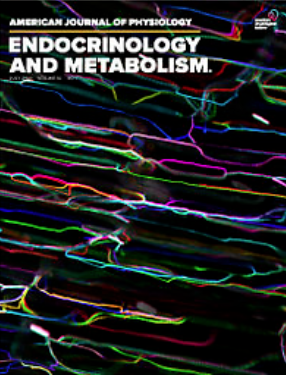糖原合成是米色脂肪组织适应性产热的必要条件,并影响饮食诱发的肥胖症
IF 4.2
2区 医学
Q1 ENDOCRINOLOGY & METABOLISM
American journal of physiology. Endocrinology and metabolism
Pub Date : 2024-04-03
DOI:10.1152/ajpendo.00074.2024
引用次数: 0
摘要
糖原是肝脏和骨骼肌等不同组织中葡萄糖的一种能量储存形式。人们对糖原如何影响脂肪组织功能的了解仍不全面。冷暴露会提高棕色脂肪组织(BAT)和腹股沟白色脂肪组织(iWAT)中编码糖原合成酶 1 的 Gys1 的表达。我们使用一种小鼠模型分析了 Gys1 的体内功能,在该模型中,Gys1 在脂肪组织中被特异性地删除。在正常进食条件下,Gys1 基因缺失对体重和糖代谢的影响很小。在长期暴露于寒冷环境或使用 b3 肾上腺素能受体激动剂 CL-316,243 处理 iWAT 时,删除 Gys1 可抑制 UCP1 和其他产热相关基因的上调。Gys1 基因缺失也会降低 CL-316,243 对脂肪基质细胞(SVFs)中 UCP1 的刺激。Gys1 基因缺失会降低脂肪组织中的基础糖原含量和 CL-316,243 刺激的糖原累积。Gys1 基因缺失的小鼠高脂饮食引起的肥胖和胰岛素抵抗会加剧。Gys1缺失也会导致CL-316,243治疗后体重减轻。总之,我们的研究结果强调了糖原合成在米色脂肪组织适应性产热中的关键作用及其对饮食诱导的小鼠肥胖的影响。本文章由计算机程序翻译,如有差异,请以英文原文为准。
Glycogen synthesis is required for adaptive thermogenesis in beige adipose tissue and affects diet-induced obesity
Glycogen is a form of energy storage for glucose in different tissues such as liver and skeletal muscle. It remains incompletely understood how glycogen impacts on adipose tissue functionality. Cold exposure elevated the expression of Gys1 which encodes glycogen synthase 1 in brown adipose tissue (BAT) and inguinal white adipose tissue (iWAT). The in vivo function of Gys1 was analyzed using a mouse model in which Gys1 was deleted specifically in adipose tissues. Under normal chow conditions, Gys1 deletion caused little changes to body weight and glucose metabolism. Deletion of Gys1 abrogated upregulation of UCP1 and other thermogenesis-related genes in iWAT upon prolonged cold exposure or treatment with b3-adrenergic receptor agonist CL-316,243. Stimulation of UCP1 by CL-316,243 in adipose-derived stromal cells (SVFs) was also reduced by Gys1 deletion. Both the basal glycogen content and CL-316,243-stimulated glycogen accumulation in adipose tissues were reduced by Gys1 deletion. High-fat diet-induced obesity and insulin resistance were aggravated in Gys1-deleted mice. The loss of body weight upon CL-316,243 treatment was also abrogated by the loss of Gys1. In conclusion, our results underscore the pivotal role of glycogen synthesis in adaptive thermogenesis in beige adipose tissue and its impact on diet-induced obesity in mice.
求助全文
通过发布文献求助,成功后即可免费获取论文全文。
去求助
来源期刊
CiteScore
9.80
自引率
0.00%
发文量
98
审稿时长
1 months
期刊介绍:
The American Journal of Physiology-Endocrinology and Metabolism publishes original, mechanistic studies on the physiology of endocrine and metabolic systems. Physiological, cellular, and molecular studies in whole animals or humans will be considered. Specific themes include, but are not limited to, mechanisms of hormone and growth factor action; hormonal and nutritional regulation of metabolism, inflammation, microbiome and energy balance; integrative organ cross talk; paracrine and autocrine control of endocrine cells; function and activation of hormone receptors; endocrine or metabolic control of channels, transporters, and membrane function; temporal analysis of hormone secretion and metabolism; and mathematical/kinetic modeling of metabolism. Novel molecular, immunological, or biophysical studies of hormone action are also welcome.

 求助内容:
求助内容: 应助结果提醒方式:
应助结果提醒方式:


